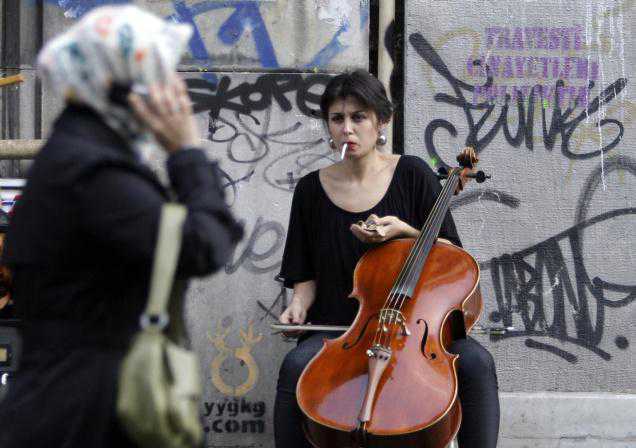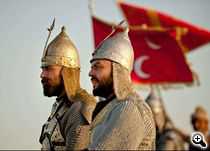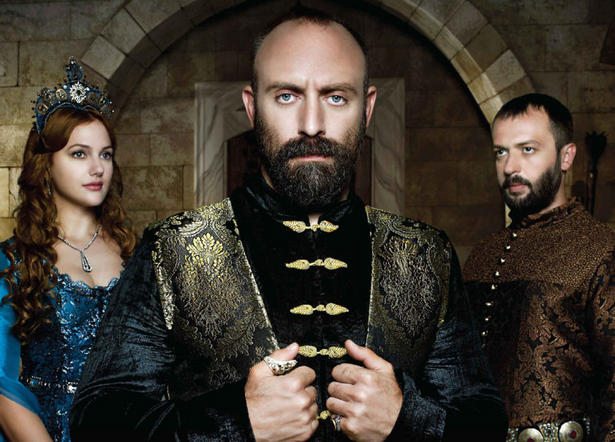Hadeel Al Sayegh
A man walks into a bedroom where a beautiful woman with dark eyes and auburn hair is sitting on the bed. He moves towards her and she greets him with a kiss. At first, she tries to hold a serious conversation, but it is not long before she succumbs to the man’s seduction.
When the saucy Turkish drama Gumus was first broadcast about seven years ago, it took the Middle East by storm, attracting more than 85 million viewers to the final episode and stirring outrage from Islamist sheikhs in Saudi Arabia and across the wider region.
The show, which ran on MBC as Noor, tells the story of a woman from the countryside who marries into a rich family in Istanbul. The series flaunts Turkey’s relative liberality, with characters frequently drinking wine and kissing on screen: two major taboos in many Muslim societies.
But many Arab fans turned a blind eye, and Turkey’s tourism sector actually saw a boost as visitors flocked to the luxury waterfront villa where Gumus was filmed. That popularity led several other Turkish series to be dubbed in Arabic.
Now, behind the scenes, Turkey is slowly pulling back from such risqué fare, given the tension between Mustafa Kemal Ataturk’s secular legacy and the influence of the Islamist-leaning Justice and Development Party (AKP) led by Prime Minister Recep Tayyip Erdogan.
Mr Erdogan’s ascendance has represented a marked shift in Turkish politics. After decades of striving for EU membership, Turkey has turned back towards its Muslim neighbours. Since the Arab Spring uprisings, Mr Erdogan has toured Egypt, Tunisia and Libya, and reached out to Muslim Brotherhood-related groups that have been empowered since their respective revolutions.
Closer to home, the AKP has lifted the ban on women wearing headscarves in public areas, introduced religious education and restricted alcohol in certain places. This has an artistic element as well – Mr Erdogan has also tried to prevent the filming of the third season of the popular soap opera Muhtesem Yuzyil, or Harem Al Sultan, that is now showing on Dubai TV.
Muhtesem is loosely based on a true story, depicting the life and women of Suleiman the Magnificent, the Ottoman Empire’s longest reigning sultan. The show, which has over 150 million viewers across Turkey, the Balkans and the Middle East, depicts the Sultan’s concubines and wives battling for his attention. In one episode, Suleiman kills his own son as a result.
Mr Erdogan has accused the directors of defaming the sultan, who is depicted as a drinker and womaniser, rather than focusing on his political achievements as he ruled the empire from 1520 to 1566.
“That’s not the Suleiman we know,” Mr Erdogan said in a speech late November. “Before my nation, I condemn both the director of this series and the owner of the television station.”
Days after his statement, Turkish Airlines removed the show from its in-flight programming.
This week, it emerged that the national airline had also introduced a new dress code for cabin crew, causing an uproar among secularists, after a leak of pictures of women in modest dress, with skirts below the knees and Ottoman style fez caps. The decision came amid reports that the airline had considered plans to ban alcohol on some routes.
The airline told Turkish media that the new dress code was just one suggestion. But the flagship’s recent statements do seem to show a steady drift away from Turkey’s secular heritage in line with the more conservative views of Mr Erdogan’s government.
It’s a storyline with which soap opera fans should be familiar. In Muhtesem, the household of the sultan is split by the rivalries between the two main wives, who are always immaculately dressed in glamorous Ottoman gowns.
Hurrem is a mischievous woman with her voluminous blonde curls and exposed cleavage, adorned with flashy jewellery. She gradually steals the sultan’s love from Mahidevran – the mother of his first child – who eventually stages a rebellion.
But in Turkey’s political drama, who is the faithful representative of the people, and who is the interloper? The AKP has consistently won at the ballot box for more than a decade, while the opposition champions Ataturk’s principles espoused at the founding of the country. Neither, it seems, nears its final act.
via A more conservative script for Turkey’s relatively liberal culture – The National.




 Ahmed Jadallah/Reuters A picture of Syrian President Bashar al-Assad was riddled with bullets on a wall of an infantry college near the city of Aleppo in December.
Ahmed Jadallah/Reuters A picture of Syrian President Bashar al-Assad was riddled with bullets on a wall of an infantry college near the city of Aleppo in December. Khaled Elfiqi/European Pressphoto Agency A protester held a sign reading “no to constitution” during a rally against Egypt’s contentious new fundamental law before voters backed the document in a referendum in December.
Khaled Elfiqi/European Pressphoto Agency A protester held a sign reading “no to constitution” during a rally against Egypt’s contentious new fundamental law before voters backed the document in a referendum in December.
